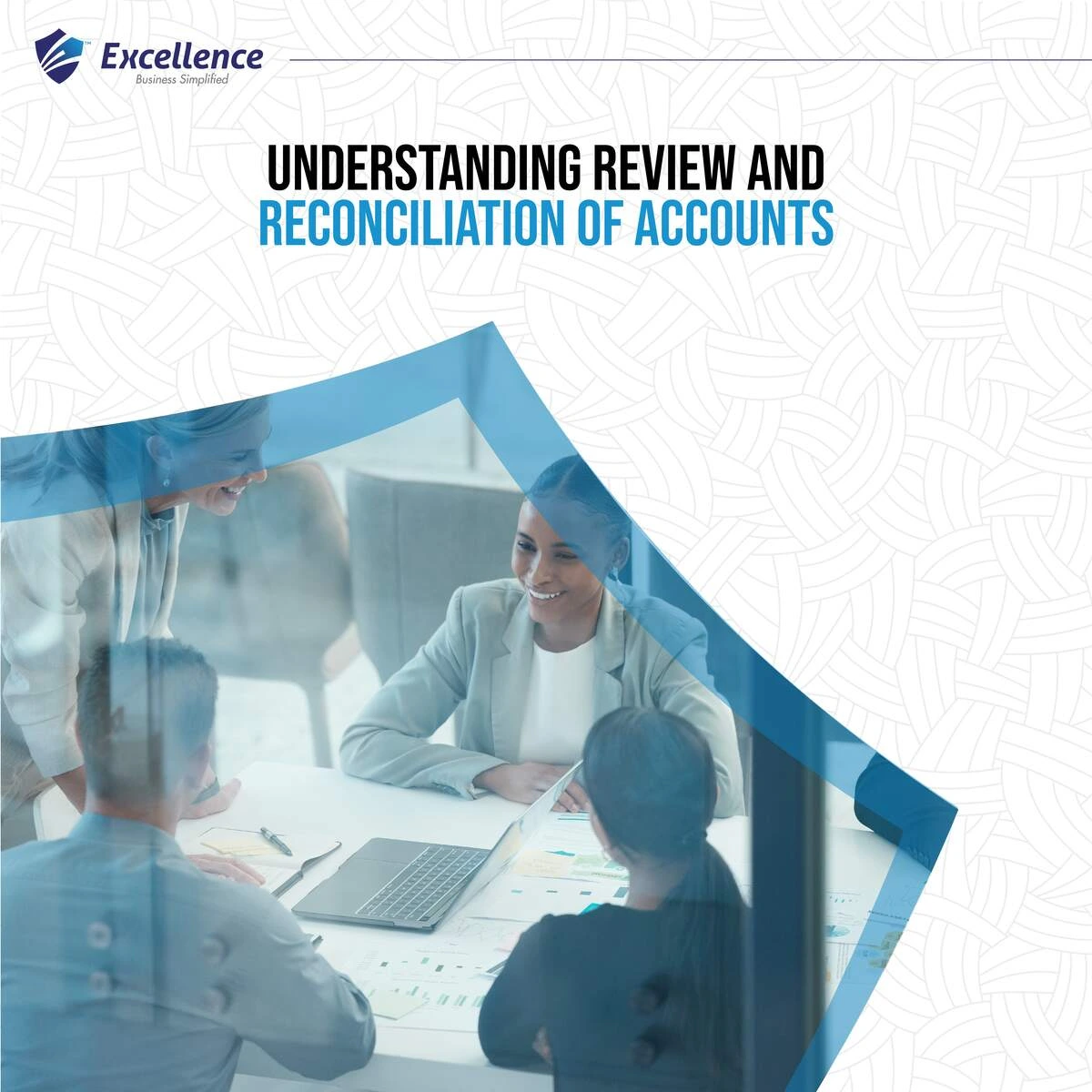What is Review and Reconciliation of Accounts?

Other people think that a company’s narrative can only be seen in its branding and customer experience, but many fail to recognize that it’s also seen in its numbers.
Behind each decision, each expansion, each setback, there’s a financial trail. And to really get to the bottom of that trail – to ensure the story is accurate, honest, and poised for success – companies have to periodically perform a process called Review and Reconciliation of Accounts.
It’s not only bookkeeping, but a process of bringing clarity, integrity, and fact-based decision-making into your operations. If you’re a startup entrepreneur navigating initial growth or an established executive overseeing global operations in a market like Dubai, you need to master this process.
Let’s take a step-by-step look at what truly a review and reconciliation of accounts mean — and why it’s one of the most effective habits a company can form and grow from.
The Story Behind the Numbers
Consider this: your company has been steadily increasing over the last six months. There are higher sales, new customers coming on board, and increased staff. At face value, all is well. But when you take a seat to break down the numbers — the real financial situation of your company shows — something then seems amiss.
There’s a discrepancy in your payment records. A bank statement for a different balance than the one reflected by your internal ledger. A vendor charge that appears to be a duplicate.
That pause, that hesitation, is the one thing that Review and Reconciliation of Accounts can cut out.
What Is Review and Reconciliation?
You may also call this the financial health check of your business. During this process, your accounts are reviewed, bringing your business in for a routine check-up. Accountants will work on your financial statements, including but not limited to your general ledger, income and expense statements, account balances, and transaction journals. It’s aims to ensure the accuracy of all your financial transactions – detecting and resolving any mistakes, inconsistencies, or anything that may not be quite right.
The process of review and reconciliation of accounts includes not only verifying what has already been documented, but really questioning it, making sure that what has been recorded is legitimate, and the right piece of financial narrative is what’s kept.
Common questions that arise when reconciling include:
- Are all transactions posted in the correct accounts?
- Have expenses been correctly classified?
- Is there anything off/not adding up in line with the company’s financial activities?
- Do the revenue figures fall short, and the invoices and receipts are not lining up, showing mismatches?
Reconciliation: Aligning with Reality
If the review is the check-up, then reconciliation is the act of bringing your internal records into harmony with outside verification — typically bank statements, credit card statements, or vendor statements.
Suppose your internal ledger indicates a customer paid you AED 2,000 in the previous month, yet your bank statement indicates a different amount of AED 5,500 deposit, then that’s a reconciliation problem. It’s an indication that something went awry in documenting or processing the transaction. It must be resolved before that discrepancy causes additional problems – whether that’s with cash flow, compliance, or even tax filings.
Why Review and Reconciliation Are Non-Negotiable?
Reconciliation might sound simple to you, but the success of it stems from consistency. It has always been the task that you need to do, without failure. It’s important that this process not get lost in the process, else it compromises the integrity of your entire financial system.
1. It Catches Errors Early
Small errors – an incorrectly entered digit, a forgotten invoice, a duplicate charge – are simpler to fix once discovered early. If not addressed, these small problems can become major ones that skew your financial reports and erode decision-making.
2. It Ensures Compliance
In business centers such as Dubai, companies are required to be compliant with high standards of financial transparency. Especially here in the economic landscape of the UAE, where things are more regulated and aligned with global accounting standards. Accounts review and reconciliation in Dubai must be done on a regular basis to accurately assist in having your financial records comply with local requirements and be audit-ready at all times.
3. It Reinforces Internal Controls
There are a lot of benefits when your business is doing timely review reconciliation, apart from compliance, it also serves as your internal control, promoting financial transparency in your processes, which in turn mitigates fraud, uncovers operational inefficiencies (if any), and promotes accountability and trust within your departments – particularly where different teams or individuals are involved in the financial process.
4. It Facilitates Confident Decision-Making
Picture attempting to navigate a vessel without a compass; that’s what business is like without reconciled, accurate financials. Budgeting for the next quarter, raising capital, planning to expand into new regions – you need reliable numbers.
The Process: How Review and Reconciliation Actually Work
As mentioned in the previous part of this blog, the review and reconciliation process is most successful when it is done consistently, it may only sound complicated at first, but it has an easy-to-follow, repeatable process.
Step 1: Gather Your Financial Statements and Documentation
First things first – pull together all your important financial info. That means your general ledger, accounts receivable and payable, payroll reports, bank and credit card statements, vendor bills, customer receipts, etc. Basically, anything money-related that shows what’s coming in and going out.
Step 2: Perform the Review
Work through your in-house documents meticulously. Check for:
- Duplicates or missing postings
- Transactions posted to the incorrect accounts
- Sudden increases or decreases in specific categories
- Manual journal entries with no clear backup
Step 3: Reconcile your accounts
The final thing is ensuring that your internal records line up with outside/external documents like bank or vendor statements; this final check ties everything together. Here, you determine:
- Timing discrepancies (e.g., a payment that was sent but has not been cleared)
- Missing transactions
- Bank charges or interest revenue unrecorded
- Unexplained or unauthorized transactions
After you have matched and verified every item, you can be sure your accounts are reconciled.
Step 4: Research and Clear Up Discrepancies
Check in on everything, as sometimes clearing up the discrepancy is as easy as finding that late deposit or missed transaction. Sporadically, though, you might need to call clients, your vendors, or your bank for clarification – either way, sorting out these differences is key to keeping your financial information accurate.
Step 5: Don’t Forget to Document Everything
When you start documenting everything, it will be notably helpful for your business’s audit, internal controls, and also ensuring the consistency between accounting periods.
A Dubai Viewpoint: Local Relevance in a Global City
In Dubai, where global and regional companies meet, fiscal accuracy is more than best practice – it’s a strategic imperative.
When your business engages with consistent and expert accounts review and reconciliation in Dubai, it not only ensures compliance with UAE tax laws (including VAT requirements) but also helps your business in positioning itself as a credible and trustworthy business entity in a highly competitive and progressive market.
No matter which scale of growth your business is in now, may it be still a start up looking to grow, an SME trying to explore more opportunities, or already an established company expanding regionally and internationally, no one can deny the fact that recorded financials and an accurate review of accounts are a prerequisite for success.
Common Challenges During Review and Reconciliation — And How to Overcome Them
Here are a few common pain points and how to handle them:
- Delayed Bank Reconciliation: If you’re only reconciling once a quarter – or worse, just once a year – you’re probably letting issues slip through the cracks. By the time you catch them, it might be too late. Doing it monthly is a much smarter move.
- Manual Processes: Tech is moving fast – and if you’re still stuck in spreadsheets and manual data entry, you’re making things harder than they need to be. It’s easier to slip up, and honestly, way more stressful. Upgrading to reliable accounting software with automated reconciliation doesn’t just save you and your team’s time – it takes the pressure off your team and helps avoid those costly mistakes.
- Untrained Staff: Without staff trained in review and reconciliation best practices, errors will get through. Upskilling your in-house finance team — or working with an expert like with us, at Excellence Auditing – can make all the difference.
Lack of Documentation: The process can’t even start without having compiled your complete transactions; in the absence of complete documentation, the whole process will just be guesswork, thus it has always been important to get into the habit of gathering and linking documentation properly (invoices, receipts, emails) with each transaction entry.
Final Thoughts: Accuracy Is Everything
Fundamentally, the Review and Reconciliation of Accounts is all about clarity. It’s about ensuring your business choices are based on facts and not assumptions. And it’s about safeguarding your firm from the dangers associated with incorrect or incomplete financial information.
Whether you’re just starting out or running an expanding business in Dubai, this process is more than a source of peace of mind – it’s a financial foundation you can build upon with confidence.
So don’t make it an afterthought. Incorporate review and reconciliation of accounts into your routine rhythm. Because the narrative your numbers are telling? It counts.
In need of assistance with implementing accounts review and reconciliation in Dubai for your company? Contact us. In Dubai or elsewhere, having an expert offer guidance has the potential to save time, decrease errors, and unlock insights that propel your business forward.



